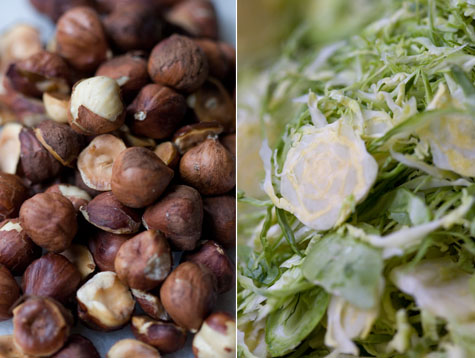
This is post 100!!!
Brussels sprouts, or Brassica oleracea gemmifera, are related to other better-known vegetables in the Brassica genus like broccoli, cabbage and cauliflower. They are part of the cruciferae or mustard family, so known because of a four-part flower in the shape of a cross.
HISTORY: Sprouts were believed to have been cultivated in Italy in Roman times, and possibly as early as the 1200s in Belgium. The modern Brussels sprout that we are familiar with was first cultivated in large quantities in Belgium (hence the name "Brussels" sprouts) as early as 1587, with their introduction into the U.S. in the 1800s. They were grown in California in the early 1900s, with the first central coast plantings in the 1920s. With the development of the frozen food industry in the 1940s, Brussels sprouts production in California increased to its highest levels over the next 20 years. As production techniques have improved, and as foreign imports have increased, there are currently less than 3000 acres of the tiny cabbages currently being produced in California. This acreage supplies the majority of the U.S. production from June through January, with nearly all of the acreage located in the central coast region, from San Mateo, Santa Cruz, and Monterey counties. Brussels sprouts are also exported to Canada, as they are more popular there than in the U.S.
NUTRITIONAL INFO: Brussels sprouts are a very good source of many essential vitamins, fiber, and folate. They are especially high in Vitamin C. (Click here to see the nutritional label) They, along with their other cruciferous cousins, have been shown to have some very beneficial effects against certain types of cancer, as they contain many different ingredients that are believed to help prevent the disease. Click here to see more health information from Health Notes.
CULTURAL PRACTICES: Brussels sprouts are planted in nursery flats in the late winter, from January through May, and spend the first 50-60 days of their lives at the nursery. During this time, the fields are prepared for transplanting by discing and plowing. Organic material (chicken manure) is spread along with lime to raise soil pH to prevent clubroot, and they are incorporated into the soil. The fields are fumigated prior to transplanting with Vapam or Telone to prevent nematodes from damaging the crop. The sprouts are then transplanted into the fields on 36-inch beds at spacings of 13-16 inches apart. They are cultivated several times to prevent weeds from taking over, and are irrigated every 3-4 weeks during the growing season by overhead sprinkler. They are sprayed with pesticides as necessary to prevent aphid and worm infestation. Several new chemistries have been developed in recent years, allowing growers to reduce the use of organophosphates and replacing them with things like Admire (R), which was delevoped by Bayer Crop Sciences. The active ingredient is Imidacloprid, the same thing found in Advantage (R), the drops you put on your pets back to prevent fleas for a month at a time. Sprout growers can apply a mere 16 oz per acre, which is shank injected into the soil during sidedressing for 90 days +- protection from the cabbage aphid, our biggest pest problem. Several new controls for worms have also been developed using chemistries that effect the physiology of the pest but are fairly innocuous for humans. For an excellent compilation of pests and remedies for Brussels sprouts, including photos, check out the UC Pest Management Guidelines. The sprouts are "topped" 50-60 days prior to harvesting by machine; the terminal bud is pinched out by hand to prevent the plant from growing taller and to send the plant's energy into the development of the Brussels sprouts. The sprouts form at the base of each leaf petiole, in a spiral along the stem, where 80-100 sprouts per plant yield 2-2.5 pounds of sprouts per plant. The plant itself grows from 2.5 to 3.5 feet tall. Just prior to harvest the leaves are cut off by hand with a machete (large knife). The plant is then cut off at the ground and fed through a stripping head, which removes the sprouts from the stalk. The stalks remain in the field and the sprouts go on to a cleaning shed, where they are cleaned and sorted, then sized and sent on to our packing facility. The smaller sprouts, 3/4" to 1.25" in diameter, are sent off to the processors for freezing, and the larger sprouts are cooled, sorted again, and packed for shipment to the fresh market.
VARIETIES: There are several different varieties of hybrid brussels sprouts currently being grown in the US. Hybrid varieties replaced the open-pollinated types produced prior to the 1960's because of the need for more uniform maturation of the plants due to the switch from hand harvesting to machine. Some of the original varieties developed, particularly Jade Cross, had several characteristics that were desirable, though they were fairly bitter tasting. The current varieties have an improved taste, as some are almost sweet. The first variety of the season in California is a hand-picked variety called Oliver. It matures rather rapidly, allowing harvesting to begin approximately 90 days after transplanting. The sprouts mature from the bottom of the plant up and are usually picked 4 to 5 times over 8-10 weeks. Oliver is a medium green color, less dense than the later varieties, and has a fairly mild taste. This variety is harvested from late June through early October. Following the Oliver comes the first of the machine-harvested sprouts. The first variety that matures in 130-150 days from transplanting is Content. They are slightly darker green, denser, with tightly wrapped leaves. These are usually available from October through November. The late season varieties are Genius and Rampart, with Genius a newly developed variety that has replaced Rowena. Genius takes from 180-195 days from transplanting to harvest, and they are available from December through January.







